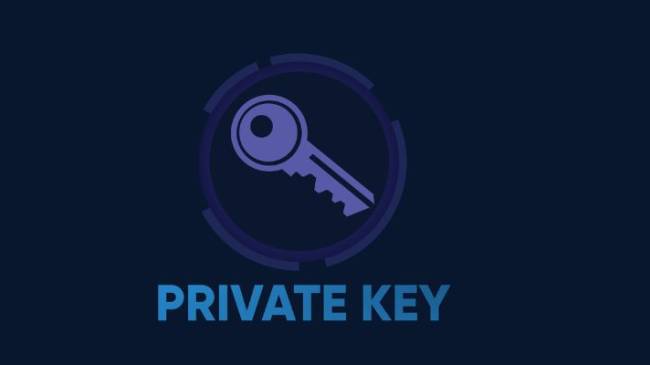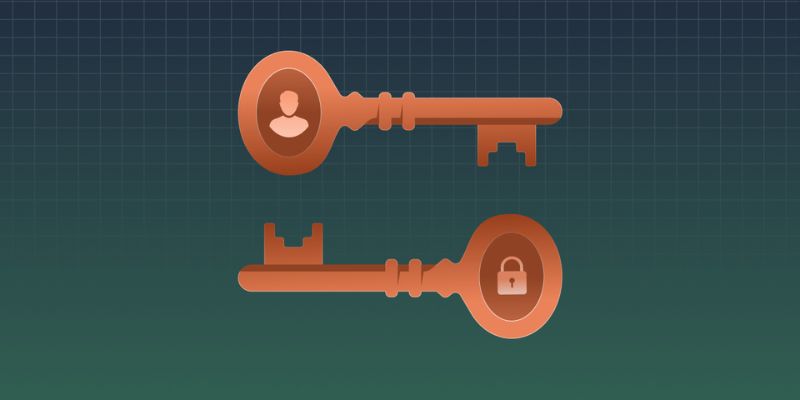If you own cryptocurrency, you've likely heard the term "private key" mentioned before. But what exactly is a private key, and why is it so important? In this article, we'll dive deeper into what a private key is, how it works, and why it is so critical for the security of your cryptocurrency assets. We'll also cover some best practices for managing your private key and keeping it safe from prying eyes.
Table of Contents
- What is a private key?
- Why are private keys important?
- How does a private key work?
- Advantages of private keys
- Where should you store your private keys?
- How to create Private Key?
- How to secure Private Key?
- How to recover Private Key if lost?
- What are the risks of losing Private Key?
- Use of private keys in cryptocurrencies
What is a private key?
In cryptography, a private key, also referred to as a secret key, is a variable that works in tandem with an algorithm to cipher and decipher data. Private keys should only be shared with authorized parties or the key's generator to ensure secure data decryption. Private keys play a significant role in several cryptographic methods, such as symmetric cryptography, asymmetric cryptography, and cryptocurrencies.
Typically, a private key is a lengthy sequence of bits that are generated randomly or pseudo-randomly to ensure that they cannot be easily predicted or guessed. The length and complexity of the private key are crucial factors in determining how vulnerable it is to brute-force attacks. These attacks involve an attacker attempting different keys until the correct one is found, and longer and more complex private keys can help prevent successful brute-force attacks.

Why are private keys important?
One of the key cryptographic innovations that enable the secure use of digital currency is the system of public and private keys. To understand how this system works, consider the decentralized nature of cryptocurrencies such as Bitcoin and Ethereum, which operate without the involvement of traditional financial institutions like banks. Instead, your digital currency is distributed across a network of computers via a blockchain, which is open to the public and displays all transaction information and public keys.
Your public key is generated through a complex mathematical process using your private key, which makes the two keys a matched pair. To verify that a transaction is authorized, you use your private key to validate the transaction made with your public key.
Despite the transparency of the blockchain system, cryptocurrency transactions remain anonymous. No personal information such as your name or address is required to use cryptocurrency. For instance, Bitcoin transactions can be viewed by anyone, but only the owner of a private key can initiate or authorize transactions.
How does a private key work?
Private key encryption, also known as symmetric encryption, uses the same private key for both encryption and decryption. This process involves generating a new private key using encryption software that ensures the key is as random as possible. The private key must then be stored securely, either offline or on a computer, and may be protected by a password, encryption, or hashing.
In symmetric encryption, the private key is also used for decryption, so a key exchange is necessary to share the key securely with authorized parties for exchanging secured data. To prevent individual keys from being used for too long, private key management is required to securely retire keys after their useful life has been reached.
Asymmetric cryptography, also known as public key cryptography, also involves the use of a private key. In this case, the private key refers to the secret key of a public key pair. The process of generating a public-private key pair is similar to symmetric encryption, but the randomness of the key is even more important. The private key must also be stored securely and may be protected by a password, encryption, or hashing.
Unlike symmetric encryption, the private key of a public key pair should almost never be shared with others. Instead, public key cryptography is used to securely share session keys used for symmetric encryption. The private key is used to decrypt data that has been encrypted with the public key of the pair, and only the holder of the private key should be able to decrypt such data.
For digital signatures, the owner of the key pair uses their private key to encrypt the signature. Key management is also important in maintaining access to data protected with a key pair, and public key pairs are often generated with expiration dates. Secret keys should be stored with the highest security, and public key pairs should be managed to avoid compromise or issues related to key pair expiration.

Advantages of private keys
Private key encryption offers a range of useful advantages, including the following four benefits:
- Enhanced Security: By using longer private keys with greater entropy, private key encryption becomes more secure and resistant to attacks such as brute-force or dictionary attacks.
- Improved Speed: Compared to asymmetric encryption, which uses public-private key pairs, symmetric key encryption is computationally faster.
- Superior Encryption: Private key encryption is widely used in most cryptographic processes for encrypting data transmissions. Typically, public key algorithms are used to securely share secret keys.
- Compatibility with Stream and Block Ciphers: Secret key ciphers used in the encryption and decryption of data usually fall into two categories: stream ciphers and block ciphers. Private key encryption works with both stream and block ciphers. A block cipher applies a private key and algorithm to a block of data simultaneously, whereas a stream cipher applies the key and algorithm one bit at a time.
Where should you store your private keys?
It is essential to ensure the safety of your private keys, just like any other password. To achieve this, there are two primary methods:
The first method is to store your private keys in an online crypto wallet. This is the simplest and most popular option for most people, and virtual wallets like the one provided by Coinbase make it easy to manage your private keys. These wallets are referred to as "hot" wallets since your private keys are stored on the internet. The advantage of using an online wallet is that it provides convenient and accessible management of your digital money, much like using a credit card online. However, it is vital to choose a wallet offered by a reputable company with a proven track record of security and additional features such as two-factor authentication.
Alternatively, you can store your private keys offline in a secure location. Some investors prefer to keep their private keys on a computer that is not connected to the internet, written on paper, or memorized. This method is known as "cold storage" and offers protection against digital theft, but it makes it less convenient to use your cryptocurrency while presenting other risks.
How to create Private Key?
Creating a private key is a critical step in setting up a cryptocurrency wallet. The private key is a randomly generated, secret, and unique alphanumeric string that serves as your ownership and access to your cryptocurrency funds. Here's how you can create a private key:
- Choose a Cryptocurrency Wallet: Select a cryptocurrency wallet that supports the cryptocurrency you want to use. Wallets can be software-based (desktop, mobile, or web), hardware-based, or paper wallets.
- Generate a New Wallet: If you are setting up a new wallet, follow the wallet's setup process to create a new wallet account.
- Randomly Generate Private Key: During the wallet setup, the wallet will automatically generate a private key for you. It is crucial to ensure that the private key is generated securely and randomly to enhance its strength and security.
- Backup Your Private Key: After the private key is generated, the wallet will typically prompt you to back it up by providing you with a recovery phrase (also known as a seed phrase). This is a set of words (usually 12 to 24) that serves as a backup of your private key. Write down the recovery phrase on a piece of paper and store it securely. Do not store it digitally or share it with anyone. This recovery phrase will allow you to restore your wallet if you lose your device or experience any issues.
- Test the Private Key Backup: Once you have backed up the recovery phrase, test it by restoring your wallet on a separate device using the recovery phrase. This ensures that the backup is accurate and functional.
- Keep Your Private Key Secure: The private key is the most critical piece of information in securing your cryptocurrency funds. Never share it with anyone, and do not enter it on websites or platforms you don't trust.
- Consider Using Hardware Wallets: For additional security, consider using a hardware wallet. Hardware wallets store your private keys offline, providing an extra layer of protection against online threats.
- Use Strong Passwords and 2FA: Set a strong password to access your wallet and enable Two-Factor Authentication (2FA) if supported by your wallet. This enhances the security of your wallet.
Creating a private key should be done with the utmost care and attention to security. The loss or compromise of your private key can result in the loss of your cryptocurrency funds. Make sure to use reputable wallet providers and follow best practices to keep your private key safe and secure.

How to secure Private Key?
Securing your private key is crucial to protecting your cryptocurrency funds from theft or unauthorized access. Here are some essential steps to keep your private key safe:
- Store Offline: The best way to secure your private key is to store it offline. Write it down on a physical piece of paper or engrave it on a metal plate. Keep it in a safe and secure location away from prying eyes and potential physical threats.
- Backup Securely: Make multiple copies of your private key backup and store them in separate secure locations. Consider using a fireproof and waterproof safe or a safety deposit box at a bank.
- Avoid Digital Storage: Never store your private key in digital formats, such as text files, emails, or cloud storage. Digital storage increases the risk of unauthorized access due to hacking or malware.
- Don't Share or Disclose: Never share your private key with anyone. Treat it as your secret passphrase to access your cryptocurrency funds. Beware of phishing attempts or scams where attackers try to trick you into revealing your private key.
- Use Hardware Wallets: Consider using a hardware wallet to store your private keys securely. Hardware wallets keep your keys offline, away from potential online threats.
- Keep Devices Secure: If you must store your private key digitally (e.g., on a software wallet), ensure that your devices are secure. Use strong passwords, enable screen locks, and keep your devices up to date with the latest security patches.
- Use Cold Storage: Cold storage solutions, such as paper wallets or hardware wallets, are safer for long-term storage of significant amounts of cryptocurrency. They keep your private keys offline, reducing exposure to online risks.
- Beware of Keyloggers and Malware: Protect your devices from keyloggers and malware. Use reputable antivirus software and avoid downloading software or files from untrusted sources.
- Consider Multi-Signature Wallets: Multi-signature wallets require multiple private keys to authorize transactions. This can add an extra layer of security, as it prevents a single point of failure.
- Test Your Backup: Periodically test your private key backup to ensure it is accurate and functional. Restore your wallet on a separate device using the backup recovery phrase to verify its authenticity.
- Educate Yourself: Stay informed about the latest security practices and threats in the cryptocurrency space. Be cautious of social engineering tactics and always verify the authenticity of websites and services.
- Plan for Inheritance: Consider how your private key will be accessed by your heirs or loved ones in case of unforeseen circumstances. Have a plan for ensuring your cryptocurrency holdings are transferable if necessary.
Remember that your private key is the most critical piece of information for accessing your cryptocurrency funds. Taking the utmost care to secure it will protect your assets from potential loss or theft.
How to recover Private Key if lost?
If you lose your private key, it can be challenging or even impossible to recover it. Private keys are generated randomly and not stored by the wallet provider, which is why it's crucial to keep a secure backup of your private key or recovery phrase. However, if you have backed up your wallet properly and still lost access to your private key, follow these steps to attempt recovery:
- Check Backup: Double-check all your backup options. If you have a hardware wallet, ensure you have the recovery phrase or seed words securely stored. If you have a software wallet, look for the backup file or recovery phrase that you may have saved during the initial setup.
- Wallet Support: Reach out to the customer support of the wallet provider or platform you used to see if they can help with the recovery process. Some wallets may offer assistance in case of lost private keys, although the success of recovery may vary.
- Consider Professional Help: In some cases, there are professional recovery services that may be able to assist in recovering lost private keys. However, be cautious, as some of these services may be scams. Research and choose reputable and trusted service providers.
- Explore Alternate Access: If you have any other devices or methods where your wallet is accessible, try to gain access and export your private key or recovery phrase from there.
- Check for Hardware Wallet Backup: If you used a hardware wallet, check if you have a backup or recovery phrase written down in a safe place. Many hardware wallets generate a recovery phrase when first set up.
- Use Wallet Seeds or Mnemonics: Some wallets may use seeds or mnemonics (a series of words) to generate private keys. If you have saved or written down these seeds or mnemonics, they may be used to recreate the private key.
- Contact Wallet Developers: If you are using a community-developed or open-source wallet, consider reaching out to the wallet's developers or community forums for guidance and potential solutions.
It's essential to act quickly if you suspect that you have lost your private key, as any delay may increase the risk of unauthorized access to your funds. In the future, consider implementing proper backup procedures and storing your private key or recovery phrase in a secure and reliable manner to prevent the risk of loss. Always prioritize security and be cautious when handling your private key to protect your cryptocurrency assets.
What are the risks of losing Private Key?
Losing your private key can have severe consequences and risks, as it is the most critical piece of information required to access and control your cryptocurrency funds. Here are some of the significant risks associated with losing your private key:
- Loss of Access to Funds: If you lose your private key, you lose access to your cryptocurrency wallet and all the funds stored within it. There is no central authority or customer support to help recover a lost private key, making it almost impossible to access the funds again.
- Permanent Loss of Cryptocurrency: Cryptocurrency transactions are irreversible. If you lose your private key and cannot access your wallet, the cryptocurrency associated with that wallet is effectively lost forever.
- Inability to Execute Transactions: With the private key lost, you will be unable to send or receive any cryptocurrency from the wallet. This can hinder your ability to conduct transactions or manage your crypto assets.
- No Account Recovery Mechanism: Cryptocurrencies are designed to be decentralized and trustless. While this ensures security and privacy, it also means that there is no account recovery mechanism like those found in traditional banking systems.
- Risk of Theft by Others: If someone else gains access to your lost private key, they can take control of your wallet and steal your cryptocurrency funds.
- Inability to Access Tokenized Assets: If your private key is lost, you may also lose access to any tokenized assets or non-fungible tokens (NFTs) associated with that wallet.
- Long-Term Consequences: Losing your private key can have long-term financial consequences, especially if you had significant holdings in the wallet.
- Loss of Investments: If your private key is lost, you may lose access to investments in Initial Coin Offerings (ICOs), Security Token Offerings (STOs), or other investment opportunities associated with the wallet.
- Emotional Distress: Losing a private key can lead to stress, frustration, and feelings of helplessness, especially if significant financial assets are at stake.
- Difficulty in Estate Planning: If you pass away without a plan for your private key, your heirs may face difficulties accessing and inheriting your cryptocurrency assets.
To minimize the risk of losing your private key, always back up your wallet securely and keep your private key or recovery phrase in a safe place. Use hardware wallets or other secure storage solutions for long-term holding of significant amounts of cryptocurrency. Be vigilant about security, avoid sharing your private key, and use best practices to protect your digital assets. Remember that being in control of your private keys also means being responsible for their security.
Use of private keys in cryptocurrencies
Cryptocurrencies, such as Bitcoin, rely on cryptographic algorithms to generate, store, and facilitate the exchange of digital assets. To ensure secure transactions, cryptocurrencies utilize public key cryptography to create digital signatures that authenticate value transfers. Additionally, symmetric encryption is employed to safeguard data exchanges.
Typically, a public-private key pair is assigned to each cryptocurrency owner to protect their own interests. While symmetric encryption is used for secret keys in cryptocurrency protocols, it is critical to securely store private keys. This is because the loss of control or access to a private key result in the forfeiture of the corresponding cryptocurrency asset. There are various security options for storing private keys, such as isolating them on a computer with no network connections, physically securing them in hard copies, or committing them to memory.
In the world of cryptocurrency, your private key is the key to your kingdom. It is essential to understand what a private key is and how to manage it properly to ensure the safety and security of your crypto assets. By following best practices for private key management, you can protect yourself against the ever-present threat of theft and fraud in the crypto world. Follow https://uniultra.xyz/ to update more useful information about blockchain and cryptocurrency investment.






